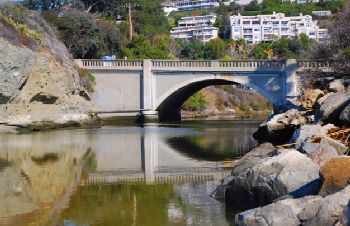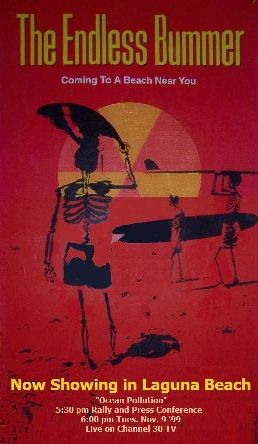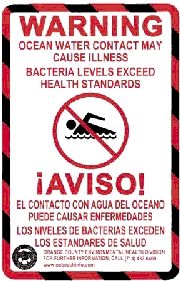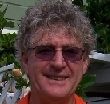
Publisher:
Bonnie King
CONTACT:
Newsroom@Salem-news.com
Advertising:
Adsales@Salem-news.com

~Truth~
~Justice~
~Peace~
TJP
Jan-12-2010 21:25

 TweetFollow @OregonNews
TweetFollow @OregonNews
How To Build An Environmental Activist
Roger Butow Salem-News.com's 'Odd Man Out'PART II in a continuing series.
 Aliso Creek photo by John Krill of Laguna Beach |
(LAGUNA BEACH, Calif.) - In October of 1999, after the TV and newspaper media began responding to our demand requiring the County to close this beach completely for recreation, the newly-formed consortium (Clean Water Now! Coalition) confronted Laguna Beach City Council requesting they take a more aggressive stance and litigate upstream polluters to protect our residents.
The Council blinked and the CWN!C co-hosted what was the first municipal meeting for this issue on November 9th, a greatly publicized and media saturated workshop with local ocean pollution as the sole topic. It was televised live to South Orange County audiences. We stupidly thought we were seeing the beginning of the end for chronic polluters and non-existent government oversight{1} .
At that time we had a very large and credible board: The Sierra Club, Doheny Longboard Surfing Association, Laguna Beach Chapter of the Surfrider Foundation, The Whaleman Foundation, South Laguna Civic Association, OC CoastKeepers, LB Lifeguards and of course CACA.
We gave the night a whimsical title The Endless Bummer.

Public officials from our city, other inland ones, water and sanitation district managers, even County agency reps (County Supervisor Tom Wilson among them) all appeared, acted very concerned, acted empathetic as politicians do, and promised immediate positive changes. They were allowed to speak first while we listened to their propaganda, excuses and faked emotions.
They basically went into a CYA, damage control mode. We weren’t allowed to speak until the very end some 3 hours later; each of the non-NGO bureaucrats had already spoken their piece and left Council Chambers post haste. We were forced to listen to them, they gave us no respect by their immediate vacancy.
Nonetheless, even though outraged, we stupidly thought we were seeing the beginning of the end for chronic polluters and non-existent government oversight. It turned out more like a bad movie: “Chinatown Meets Jaws”.
Eventually, by late 2000, two seminal studies were handed out at the monthly watershed study groups the County of Orange and USACE, hosted at Dana Point Harbor Boathouse near the Ocean Institute.
These two extensive texts were hundreds of pages thick; they became for me the Old and New Testaments. Several other NGO representatives acquired copies, but I guess I must have been the only one to bother reading them as part of my watershed education.
Subsequently, over the years after I procured then read them thoroughly, I kept quoting them, and eventually realized that the public agency stakeholders, their engineers and staff, apparently tossed them unread into their file cabinets to gather dust.
Both were wonders of information, both were federally funded: The February of 1997 US Army Corps of Engineers (USACE) San Juan and Aliso Creek Watershed Management Study (Reconn Report) and the October of 2000 Aliso Creek 205 (j) Water Quality Planning Study.
I recently paid to have them scanned to CD-ROM, but have as yet to find anyone other than myself who has read this treasure trove front-to-back.
These studies held most of the EPA's scientific analysis, the smoking guns of water quality impairments, and identified where the greatest concentrations of pathogens and aquatic toxicity hot spots were located.
This would lead to my personal creation of the “Toxic Soup Tour”, an actual guided tour of these hot spots, but I’ll discuss that in a later column.
Suffice it to say, Aliso Creek has historically been one of the most publicized federally listed Impaired Waterbodies (303 d), plus it's on a High Priority (305 b) federal list as well. It has the typical gamut of carcinogenic toxins associated with densely developed watersheds, albeit a small ‘shed at about 36 square miles of drainage area{2}.
As approximately 80% of that drainage into Aliso Creek is composed of impervious surfaces, expert resources like The Center For Watershed Protection (CWP) acknowledge the Promethean task of reversing aquatic and riparian habitat impairments{3}.
The CWP, in fact, cites the exponential difficulties: Once a watershed is over 25% impervious, the task of halting or reversing degradation becomes not only increasingly expensive but logistically a nightmare. Restorations of urbanized watersheds require massive funding (tens of millions) and extensive, cooperative staff help from federal and state agencies.
Things like the necessary acres of wetlands for natural filtering and cleansing, and the native species habitats that give it biologically functional stream value no longer exist anywhere in watersheds like Aliso Creek, making eco-restoration grant assistance nearly impossible to procure{4}.

When the County developed the area near the Aliso Pier in 1971 they heavily constricted and channelized the creek, and built large parking lots on the beach and inland sides of Coast Highway. They paved over an incredibly beautiful and pollutant-cleansing 3 acre estuary at the creek mouth, one that also constituted habitat for the endangered tidewater goby and migratory Southern Steelhead Trout.
“Pavement = Pollution” is a simple equation knowledgeable water quality experts agree upon. County and municipal politicians campaign coffers were fat from developer contributions over the years. None could summon the courage to “Just Say No” to any massive projects, and the land use lobbyists and consultants fattened like ticks on the rubber-stamped building permits and paperwork.
Informative hyperlinks:
{1} ocweekly.com/1999-10-21/news/talking-shit/1
{2} Center for Watershed Protection
{3} ocweekly.com/2000-01-20/news/beautiful-lake-wilson/
{4} en.wikipedia.org/wiki/Urban_runoff
Roger Butow articles on Salem-News.com:
- New Column: 'Odd Man Out' Will Clear the Air Over Environmental Contaminants - Salem-News.com Staff Report
- The County Formerly Known as 'Orange' - Roger Butow Salem-News.com
- 'Larry Agran, Great Park Gangbanger: Liar, Liar, Pants on Fire?' - Roger Butow for Salem-News.com
- Caltrans Stimulus Paving Project in Laguna Beach Pollutes Air and Sea - By Roger Butow for Salem-News.com
- Fear and Loathing at MCAS El Toro: Report From the Restoration Advisory Board - Roger Butow Salem-News.com
===========================================
 Odd Man Out is the creation of Roger von Bütow, a professional environmental consultant. Written exclusively for the Salem-News, it's intended as the next evolutionary step on the path of an eco-warrior.
Odd Man Out is the creation of Roger von Bütow, a professional environmental consultant. Written exclusively for the Salem-News, it's intended as the next evolutionary step on the path of an eco-warrior.
Roger is a Southern California native who spent his formative years as a racial minority: A blonde-haired, blue-eyed surfer on the mean streets of the LA Harbor area. Running from gangs eventually trained him for his high school and collegiate track and cross-country career. Going to college part-time, disqualified for a student deferment, when his draft notice arrived in a fit of machisimo he joined the USMC in 1965, eventually attached to the 3rd Marine Air Wing.
Once honorably discharged, he resumed his college studies, majoring in philosophy. He dropped out in early 1972 when an opportunity to travel in Europe inexpensively for 6 months was too good to pass up. Upon returning, he and his former wife ended up in Laguna Beach, and though the marriage didn’t last his love of the place is in its 38th year.
Disgusted by chronic sewage spills and toxic urban runoff pollution that triggered constant beach closures in his area, he formed “Clean Water Now!” in 1998. Local surfers, skimmers and divers were pissed off, but there wasn’t a cohesive, unified and aggressive group response, zero leadership or activism facilitated by the Surfrider Foundation or Sierra Club regarding water quality impairment issues. You can write to Roger at: rogerbutow@mac.com
SEE STAFF LINK FOR THE REMAINDER OF ROGER'S BIOGRAPHY
Articles for January 11, 2010 | Articles for January 12, 2010 | Articles for January 13, 2010
Quick Links
DINING
Willamette UniversityGoudy Commons Cafe
Dine on the Queen
Willamette Queen Sternwheeler
MUST SEE SALEM
Oregon Capitol ToursCapitol History Gateway
Willamette River Ride
Willamette Queen Sternwheeler
Historic Home Tours:
Deepwood Museum
The Bush House
Gaiety Hollow Garden
AUCTIONS - APPRAISALS
Auction Masters & AppraisalsCONSTRUCTION SERVICES
Roofing and ContractingSheridan, Ore.
ONLINE SHOPPING
Special Occasion DressesAdvertise with Salem-News
Contact:AdSales@Salem-News.com

googlec507860f6901db00.html



Terms of Service | Privacy Policy
All comments and messages are approved by people and self promotional links or unacceptable comments are denied.
Roger von Bütow January 14, 2010 5:21 am (Pacific time)
Sarah: Thanks.....I hope that you find the time to browse the links provided to help supplement my personal thoughts. Without trying to sound like a whiner, I think that folks in other areas can learn from these failed precedents like Aliso Creek. How to do it the wrong way, the warnings signs occurring over decades of abuse, and obvious lack of political will, can lead to condemnation of previously functional ecologies...Not to mention create hazardous health conditions. Viruses like Hepatitis A can live for up to 90 days in water over 60 degrees---Aliso never gets below 62 degrees, in part due to the great area of concrete lining (it's basically a glorified drainage ditch), it's shallow streambed that heats up during the day but also the organophosphates/contaminants that keep the temps falsely elevated. A stream is the report card for a watershed---And this one has been getting an "F" for years. I hope that people in other regions look for the symptoms, the warning signs of adverse impacts that can lead to terminal patients. It's like early detection of cancer---Treatment/intervention must be a priority. From our Laguna Beach City Council to our Board of Supervisors to our State and Federal reps, none has managed to find more than a random million or two when 10's of millions are now necessary. Now the price tag and sticker shock leave Aliso slipping into eco-darkness, beyond redemption: So the warning is this: Watch out! This could be (or maybe already is) your watershed. Be vigilant or else your stream, lake or recreational waters may become hazardous to you and yours. What good are local environments if they're devoid of life and are dangerous to even dip a toe in?
Sarah Green January 13, 2010 3:22 pm (Pacific time)
Very enlightening and informative article, thanks Mr. Butow for keeping the candle lit for Orange County's citizens.
[Return to Top]©2025 Salem-News.com. All opinions expressed in this article are those of the author and do not necessarily reflect those of Salem-News.com.